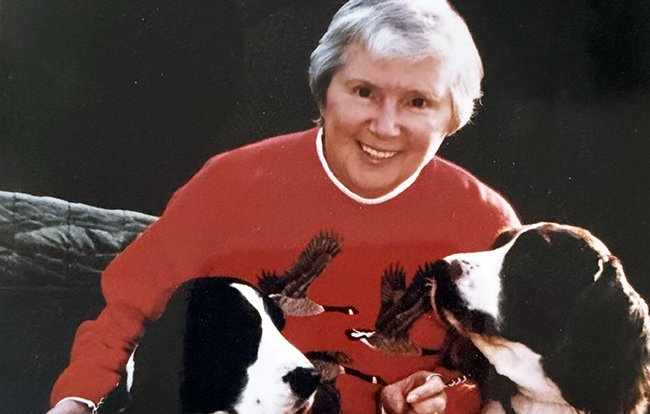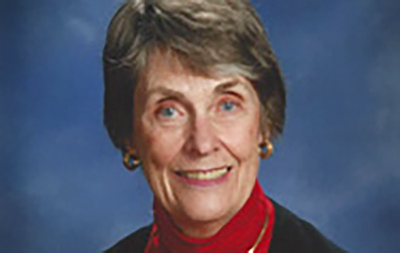Obituary: Lawrence Allen Thornton

Distinguished, award-winning novelist, critic, college professor
Distinguished American novelist Lawrence Allen Thornton died June 20 in Pomona. He was 85 years old.
“Thornton has a prominent place in literary modernism as a novelist, gifted storyteller, and disciplined master of language arts, and as a perceptive and prolific creative writer whose stylistic directions, ideals, and justice-driven advocacy succeed in contributing significant, permanent and positive pages,” his family shared.
Thornton’s works include the novels “Under The Gypsy Moon,” “Ghost Woman,” “Sailors on the Inward Sea,” “Teresa Degli Spiriti,” “Labyrinth of Darkness,” and “Unbodied Hope: Narcissism and the Modern Novel, Cantata De Ossos.” In 2003, his 1987 novel, “Imagining Argentina” was made into a movie directed by British playwright Christopher Hampton, starring Emma Thompson, Antonio Banderas, and Claire Bloom.
“An especially accomplished writer, educator, and critic, Thornton is best known for his ‘Argentina Trilogy,’” his family said. His numerous awards and fellowships include several PEN America Literature Awards, the John Simon Guggenheim Fellowship, and the National Endowment of the Arts Fellowship. During the 1990s, he was a regular reviewer for the New York Times Book Review. In a remarkably long, diverse, and successful career, Thornton taught literature and writing to generations of students at University of California, Santa Barbara, Montana State University, Carleton College, Minnesota, UCLA, University of California, Irvine, Claremont Graduate University, and Pomona College. A voracious reader throughout his life, and an astute student and teacher of literature, he focused on creative writing, and on the place and practice of the novel as a preeminent, progressive, and humanitarian voice. Thornton pursued the transformative powers of writing and storytelling in politics and the human condition, and in shaping a more equitable society and peaceful world.
Lawrence A. Thornton was born in Pomona, grew up around his father’s hardware store, and had early, restless passages in auto mechanics, semi-pro baseball, and the U.S. Army. After graduating with a B.A. from UC Santa Barbara in 1960, he married Lois Lynn Mashburn. Their daughter, Shelley Thornton, was born in 1963. In 1967, he returned to UCSB for his M.A. and Ph.D. as a select student under Hugh Kenner, a major academic figure and expert in literary modernism. At UCSB, Thornton met his second wife, Toni Clark, who earned her master’s degree and a Ph.D. in English there. They married in 1969, and remained a lifelong pair. They shared a goal of permanent positions in Southern California for both, and the first steps of their respective academic careers had professor Thornton at MSU, Bozeman, while professor Clark taught in Minnesota. Many airplane flights later, Thornton joined her in Minnesota and taught at Carleton. A few years after, they returned and settled in Claremont.
While Thornton taught at Bozeman for five years, Southern California was always with him. Spanish language and cultural sensibilities, architectural influences, and remembered sights and sounds were even more in heart, mind, and hand as he studied classical and flamenco guitar with Christopher Parkening there. During his Montana years, Thornton’s thoughts and literary voice remained deeply colored by wars and conflicts at home and abroad, by violence against protests and upheavals of racial, social, and cultural injustice, by the assassinations and assaults on democratic ideals and individuals. He further sharpened and aimed his mind and pen at authoritarian atmospheres and affects. Thornton shaped multiple responses to corruption, false patriotism, propaganda, and the misuse of language and the power of lies to distort and kill.
It was in Montana that Thornton wrote his critically acclaimed novel “Imagining Argentina,” the first of three works in his “Argentina trilogy.” Together with “Naming the Spirits” (1995), and 1997’s “Tales From the Blue Archives,” each of his “trilogy” novels transport the reader to Argentina and its “dirty war” period of 1976 to 1983, when an estimated 30,000 people mysteriously disappeared under its U.S. supported military dictatorship. Terrible and turbulent times unfold around manifold settings and reverberations with police state pervasions, deadly paramilitary cruelty, and lasting devastations of that authoritarian regime. “Thornton’s stories are immersed in layered dynamics of ruthless power, the suffering and losses of its victims, and dimensions of response, resistance, and resilience, in body and mind,” his family continued. “He inscribes dark lines on militarism and its perverse profits, narratives, agency, judiciary; its punishments and executions, no matter the place or time.”
Thornton and partner and wife Clark lived longest in Claremont, where they shared many harmonious academic interests including in areas of medieval and modern literature, women’s studies, and environmental activism. He demanded responsible stewardship of the planet and the ethical treatment of its flora and fauna, and decried a lack of consequences for powers and perpetrators of spills along his beloved West Coast and elsewhere. After 40 years at Claremont, he retired from teaching. The couple, along with a string of beloved cats and dogs, enjoyed the beautiful gardens of their residence, the fullness of life marked with deep discussions, shared meals, music, and laughter, and many travels in Ventura, Big Sur, Carmel, Maui, and more. Clark, a retired Pomona College dean, English department chair, and professor emerita, also gave tours at California Botanic Garden.
After his wife Clark died in September 2016, he spent his remaining years honoring her memory by finishing his final novel in her honor and creating an endowment fund to benefit the Pomona College Women’s Union, a feminist and activist space for which she had been a driving force.
“Family, friends, colleagues, and students undoubtedly recall Larry’s distinctive gentle manner and voice, his intelligent, responsive smile, his sustaining sense of humor forever near, ready, active,” his family said. “In his physical presence, his special combination of these relaxing qualities were known and natural parts of his personality, of his teaching and social conduct, and integral to his biography and to the affects of his interactions and works. Moreover, Thornton’s characteristic in-the-moment ways with people and words were unforced, flowed easily, put wide-ranging possibilities onto more seamless pathways, brought things closer to more reachable, understandable forms. He wanted to share keys of language, not hoard; to converse, not dominate; to nurture talent and the best in us, not impede it. If habitually disarming, welcoming and reassuring, he was just as ready to say ‘I don’t know.’
“Thornton worked tirelessly for his readers, students, and his discipline, for enjoyment and confidence with literature and story and their making, for all sorts of reporters on the life of the heart and mind. He sought its role in democracy and preparation for those who oppose independent control and freedom of exploration and exercise; taught his particular takes on the ‘objective correlative’ and other ideas on the limits of language: he said, ‘You can pretty much say anything you want to.’”
Lawrence Thornton is survived by his daughter, Shelley Thornton Stauffer; nephew Peter Hoveland; and cousins Shannon Miskulin and Kym Leggitt.
A celebration of life will be held in the spring on the Pomona College campus.
Donations in his memory can be made to the Dr. Toni Clark and Dr. Lawrence Thornton Endowment Fund benefitting the Pomona College Women’s Union (email robin.flynn@pomona.edu for more information; and/or the Southern Poverty Law Center at support.splcenter.org, or by check to 400 Washington Ave., Montgomery, AL 36104.








0 Comments